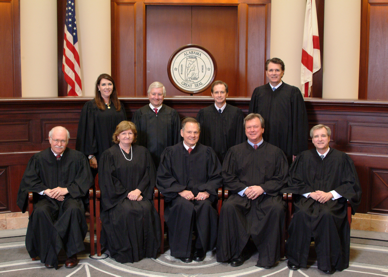There are now at least two lawsuits like this in the federal courts.
Tuscaloosa reverend Curtis Travis has been voting his whole life in Alabama. While nearly one-fourth of the voting population, like him, is black, the three highest courts in the state are entirely white, and have been so for more than a decade.
On Wednesday, Travis and three other African American voters sued the state for conducting its judicial elections in a way they say prevents voters of color from electing the candidates of their choice. They argue that at-large elections, in which the entire state votes on all of the state’s top judges, has prevented them from electing anyone who truly represents them.
“There have been years of minorities making strides, but the white men continue to hold disproportionate power our state,” he said on a call with reporters. “Alabama is more diverse now than ever, but our judges are not.”
The Alabama State Conference of the NAACP, representing these four black voters, accused Alabama on Wednesday of violating the Voting Rights Act by electing all 19 of the state’s top judges in statewide, at-large races with partisan primaries. It is one of just five states to choose their judges this way.
Jim Blacksher, an Alabama civil rights attorney working on the case, said that the state’s extreme racial polarization and history of voter suppression made it a prime target for a lawsuit.
“The Republican Party has really mobilized the majority-white electorate of Alabama,” he said. “So the only way African Americans will have a chance to elect candidates of their choice is if the method of elections is changed.”
The plaintiffs are demanding the federal district court in Montgomery divide the state up into districts that each elect a member of the state’s Supreme Court and appellate courts. That way, the few sections of the state with majority-black populations have a chance at electing a judge of their choice to the courts.
The lawsuit notes that since 1994, every African American candidate that has run for any of the three top courts has lost to a white candidate. Only two black judges have ever been elected to the state Supreme Court, and zero have served on either the Court of Criminal Appeals or the Court of Civil Appeals in the entirety of the state’s history.
“We need to create a judiciary that reflects the great diversity you see across the great state of Alabama,” said Kristen Clarke, the president of the Lawyers’ Committee on Civil Rights Under Law.
I note this mostly because there was a similar lawsuit filed in Texas in July. As with this lawsuit, that filing requested a district system to replace the at-large one as the solution. (The Lawyers’ Committee on Civil Rights Under Law is involved in both cases.) I have mixed feelings about that, as 1) any district solution would also be subject to redistricting, and that has its own set of issues to contend with, and 2) in each case, the state could effectively pre-empt this litigation by switching to an all-appointment system, which also has its own set of issues. Which is not to say that the current setup is optimal, just that I don’t know right now what might be preferable to it. I mean, getting each of those states to a place where both parties are competitive at the statewide level would probably help, but good luck with that. Daily Kos has more.

